2010 Toyota Prius Vs. 2010 Honda Hybrid

We recently pitted the next gen Toyota Prius against the forthcoming Chevrolet Volt. The contest was theoretical, predicated on the arrival of the Volt in 2010 (and performing as advertised). Meanwhile, there’s no question about the reality (and viability) of Honda’s new hybrid sedan. It’s set to hit the showroom floor in April 2009, around the same time as the new Prius. While the Volt waits in the wings, the Toyota – Honda gas – electric rivalry will be an epic showdown.
Honda has stumbled around trying to find the right hybrid formula since 1999 when it introduced the gas – electric Insight. The ultra-light two-seater scored a record-breaking 70mpg on the [old] EPA highway test, but broke no sales records. The ensuing Accord hybrid was D.O.A. The follow-up Civic hybrid sells reasonably well, but it’s a wallflower compared to segment-buster Prius.
It looks like Honda’s finally found the right formula. Spy shots reveal a distinctly familiar shape: a combination of Prius flattery, Honda’s fuel-cell Clarity and the relentless pursuit of aerodynamics. Equally important, Richard Colliver, exec Veep of American Honda recently revealed that a base Honda hybrid will sticker at $18,500. If true, it will undercut its Toyota competitor by a healthy $3k.
Honda’s hybrid (“Hh”) is based on the Fit platform, stretched a few inches. Since the Fit already offers excellent space utilization, the Hh may give the Prius a run for the money in terms of interior volume. But what’s going on under the hood is more intriguing.
For now, Honda is stuck with its IMA (Integrated Motor Assist) “mild-hybrid” technology. The system essentially negates electric-only drive, except for 26 seconds every fifth Tuesday of the month. Further tweaks may increase that slightly, but forget about silently sneaking-up on unsuspecting blind pedestrians.
Honda’s trump card is rationalizing IMA production, bringing the hybrid premium of the system, batteries and all, down to about $1500 (as compared to a conventional drive-train). That makes the target $18.5k price look a bit less of a bargain, compared to a $14k Fit. What, a profitable hybrid right out of the starting gate (I’m looking at you, Volt)?
As usual, Honda achieves much with little. The technically-similar Civic hybrid’s 42mpg EPA combined rating is only eight percent less than the (current) Prius’ 46mpg. That wasn’t close enough to overcome the $22.6k Civic hybrid’s cloak of invisibility. But I’m guessing the lighter/more aerodynamic Fit-based hybrid will yield a (current) Prius-like 46 mpg EPA combined rating. Meanwhile, the new Prius will be deemed a flop if it’s combined rating doesn’t break the half-century mark.
Let’s put those numbers in perspective. Incremental efficiency gains at these sippy-cup levels become increasingly insignificant– unless gas prices really explode. At four-bucks a gallon, a 51mpg Prius saves $119/year (@14k miles). Even at six dollars, the annual fuel savings would be all of $180. It would take 25 (or 17) years to amortize the Prius’ higher price. You’d have to be a committed Peak-Oiler to justify the Prius’ premium on fuel savings.
So what will the latest Prius have going for it above the upstart Hh? It might still be a bit roomier, and have a smoother ride. But if four adults and their luggage can be comfortably accommodated in the Honda, that may be good enough for many hybrid intenders.
The Prius’ presumed higher EPA numbers might offer a smidgeon of green bragging rights, but the Honda’s shape has “hybrid” written all over it, so who cares? The Honda guarantees hyper-mileage and Green-creds, all at a lower price point.
What the Honda hybrid lacks is any viable upgrade/expansion into the plug-in future. Its IMA system is not socket friendly. Toyota will offer a Li-ion plug-in Prius to fleets in 2010, and to the public in 2011.
It would be a mistake to under-estimate the importance of plug-ability for the serious eco-road-warriors. For green halo seekers, nobody’s going to know whether your Prius is a plug-in or not, except for the port and attending badges. An aftermarket in fake plug-in ports (and badges) is as assured as the current market for fake Buick Lucerne portholes.
Is there a winner in this dual-mode duel? You bet: the consumer. Toyota’s plans to double Prius annual production to 480k, and Honda’s plans to sell 200k annually of its keenly-priced new entry, mean that street prices will be mean. Transaction prices of Priora historically have tracked gas prices. If the current pull-back in oil prices lasts into next year (my guess), expect to see the return of hybrid incentives, bigger than ever.
And then the real hybrid showdown begins, and history has a chance to repeat itself: GM’s latest Johnny-come-lately, technologically-ambitious, expensive/unprofitable, fully-fledged (one hopes) entry into the segment arrives (a.k.a. Volt). It will take on the well-established, low-cost, high-mileage competition from Japan– just like in the sixties, seventies, eighties, nineties, aughts…

More by Paul Niedermeyer
Latest Car Reviews
Read moreLatest Product Reviews
Read moreRecent Comments
- MaintenanceCosts I wish more vehicles in our market would be at or under 70" wide. Narrowness makes everything easier in the city.
- El scotto They should be supping with a very, very long spoon.
- El scotto [list=1][*]Please make an EV that's not butt-ugly. Not Jaguar gorgeous but Buick handsome will do.[/*][*] For all the golf cart dudes: A Tesla S in Plaid mode will be the fastest ride you'll ever take.[/*][*]We have actual EV owners posting on here. Just calmly stated facts and real world experience. This always seems to bring out those who would argue math.[/*][/list=1]For some people an EV will never do, too far out in the country, taking trips where an EV will need recharged, etc. If you own a home and can charge overnight an EV makes perfect sense. You're refueling while you're sleeping.My condo association is allowing owners to install chargers. You have to pay all of the owners of the parking spaces the new electric service will cross. Suggested fee is 100$ and the one getting a charger pays all the legal and filing fees. I held out for a bottle of 30 year old single malt.Perhaps high end apartments will feature reserved parking spaces with chargers in the future. Until then non home owners are relying on public charge and one of my neighbors is in IT and he charges at work. It's call a perk.I don't see company owned delivery vehicles that are EV's. The USPS and the smiley boxes should be the 1st to do this. Nor are any of our mega car dealerships doing this and but of course advertising this fact.I think a great many of the EV haters haven't came to the self-actualization that no one really cares what you drive. I can respect and appreciate what you drive but if I was pushed to answer, no I really don't care what you drive. Before everyone goes into umbrage over my last sentence, I still like cars. Especially yours.I have heated tiles in my bathroom and my kitchen. The two places you're most likely to be barefoot. An EV may fall into to the one less thing to mess with for many people.Macallan for those who were wondering.
- EBFlex The way things look in the next 5-10 years no. There are no breakthroughs in battery technology coming, the charging infrastructure is essentially nonexistent, and the price of entry is still way too high.As soon as an EV can meet the bar set by ICE in range, refueling times, and price it will take off.
- Jalop1991 Way to bury the lead. "Toyota to offer two EVs in the states"!



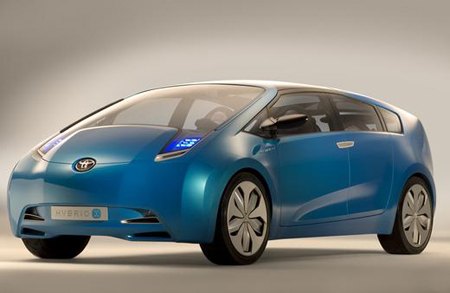















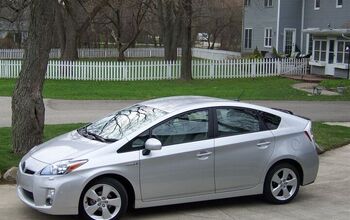

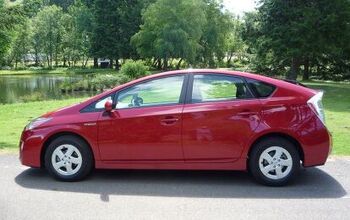
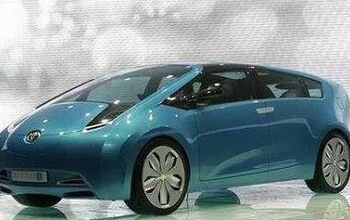
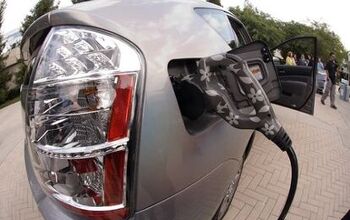




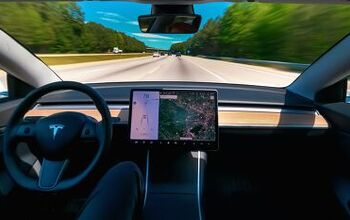





Comments
Join the conversation
Well, for the time being the Volt is as good as vaporware until it enters the market and prove its worth (at least in terms of sales numbers and reliability). Until that happens, the Prius will remain the standard by which all alternative fuel platforms are measured, and the overdue and shameful lateness of the Volt does nothing to make it unique or trend-setting when compared to the Prius or any other high FE hybrid for that matter. But, I hope GM finally picks up a success in the Volt for a change. If they don't... then, not to worry. We have Toyota and Honda that will continue to show what leadership and forward thinking looks like.
DetroitIronUAW, GM's plans are for a handful of Volts in 2010, 10K in all of 2011 and then just 60K per year through 2014 or so. That's less than a third of Toyota's current Prius sales in the US and Toyota's ramping up in 2009 (about double the production). It just isn't a competitive force in the marketplace until it gets some real quantity going.